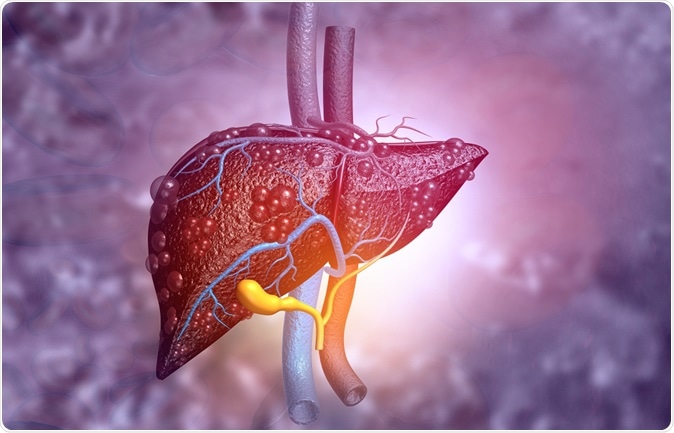A new study has shown that people who live in cold and dark regions tend to be heavy drinkers. The data comes from participants of around 193 countries and shows that there is a connection between weather, alcohol consumption as well as alcohol associated liver disease. The study results appear in the latest issue of the journal Hepatology.

3d illustration of diseased liver. Image Credit: Explode / Shutterstock
According to lead author Ramon Bataller, associate director of the Pittsburgh Liver Research Centre this had been speculated before but had never been proven. He said that it was always wondered why people in Russia or Wisconsin drink more than others and the answer has been that because the regions are colder. He said that this study connects not only alcohol consumption and colder climate but also the weather and alcoholic liver cirrhosis. Experts have said that drinking leads to a feeling of warmth because alcohol can increase the blood flow to the skin. Alcohol use and cold climate with lack of sunlight are also associated with increased depression rates, experts opine.
The study shows that cold climate and lack of sunlight in associated with increased alcohol use as seen from data correlated from World Health Organisation (WHO) and the World Meteorological Organisation. The researchers note that with decrease in total hours of daylight and average daily temperatures, the alcohol intake person also tends to rise as does the percentage of population that drinks alcohol. There is also a significant rise in binge drinking as the temperatures plummet and days shorten.
The researchers have suggested that there should be higher pricing and stricter laws regarding alcohol use and advertising in the winter months to prevent alcohol use. Studies have shown that no amount of alcohol is safe for consumption. Alcohol use has been linked to myriad of diseases including those of the liver as well as several cancers.
Following this study the WHO is also all set to release new data on alcohol consumption across Europe at a meeting in Edinburgh. The data shows that nearly half of all adult male population are at risk of short and long term health and social problems associated with harmful drinking.